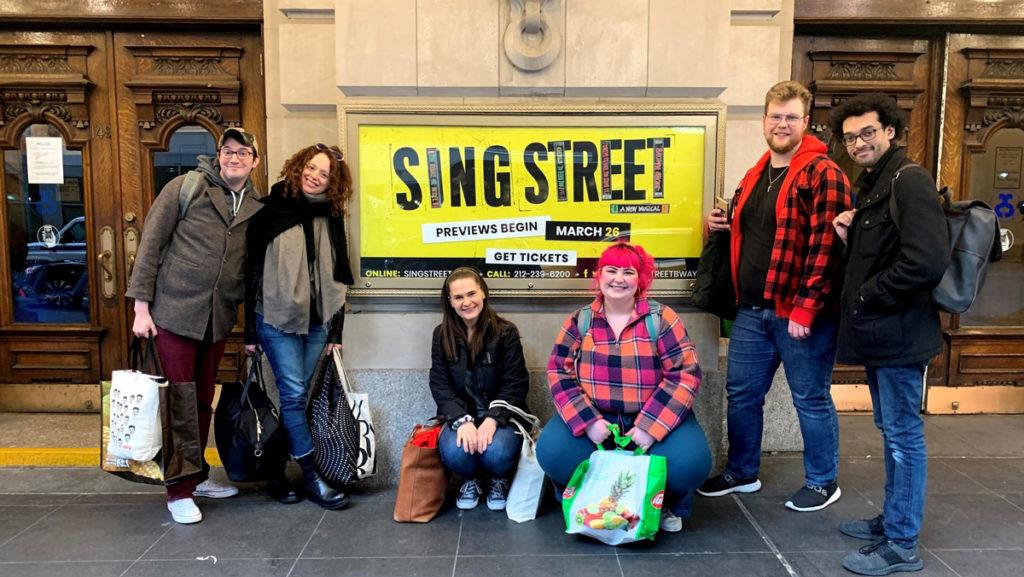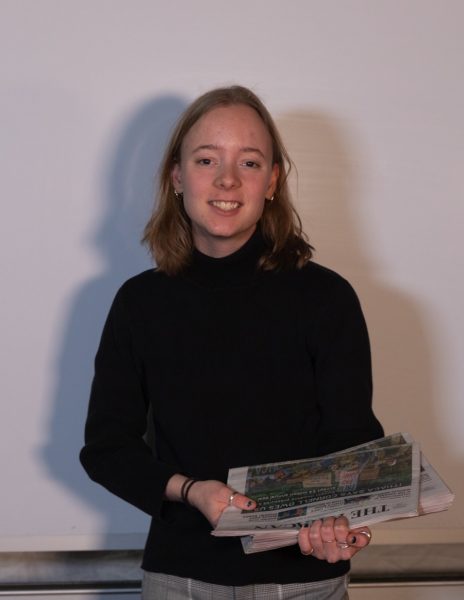“Sing Street” was a new musical set to open on Broadway in April at the Lyceum Theatre in New York. A short five hours after being onstage for her first day of technical rehearsals, Amanda Spooner, assistant professor in the Ithaca College Department of Theatre Arts, heard production was coming to a halt. In fact, all of Broadway was being shut down because of the COVID-19 pandemic.
Spooner was a stage manager for “Sing Street” before it was postponed. She has stage-managed for a number of regional and off-Broadway shows, including performances at the Lincoln Center Theater and The Public Theater in New York.
Like Spooner, many professors in the Department of Theatre Arts have worked on professional productions, taking what they learned and bringing it back to their classes. Because of the shutdown, professors like Spooner had to take a pause on sharing their firsthand stage experience with their students.
Spooner said one of the hardest parts of “Sing Street” shutting down was having to pack up a show that never had a preview.
“I was most excited about having my students in the space with me,” Spooner said. “My students were set to intern [with “Sing Street”] over the summer. That was the biggest disappointment.”
While Broadway will remain dark until May 31, 2021, Spooner said that she will teach classes on stage management and theater production at the college. Spooner said her style as a professor involves integrating professional experience into her teaching.
“For me, it’s a great benefit to my students to be able to be incorporated as interns or as employees on things that I’m working on,” Spooner said. “There’s also obviously a lot that we do in [Dillingham Center], and they need guidance on that and a presence for that, so it’s figuring out what the balance is and how to make both those things happen.”
Junior Deletris Bryant is a theater studies major currently taking Spooner’s class on stage management. Bryant said that through connections they made through Spooner, they were able to spend past fall and spring breaks shadowing stage managers on Broadway on shows like “Beetlejuice,” “Be More Chill” and “Oklahoma.”
“Spooner has been there for me a lot during developmental points and trying to reach out to people or figuring out what I want to do,” Bryant said. “She’s really been a rock in that way of helping me think through … where I’m headed.”
Christine Heesun Hwang was a junior musical theater major when she booked the role as the Kim alternate on the North American tour of Miss Saigon in 2019. The tour was slated to end in June but instead shut down mid-March because of the pandemic. As a result, Hwang and her colleagues had no source of income and were displaced across the country.
“It’s scary because … there’s an endurance part of this industry that people will tell you about, but now, it’s how much can we endure with the pandemic with not knowing when we’re going to get our [jobs]?” Hwang said.
Senior Dharon Jones is an acting major who took the 2019–20 academic year off to perform on Broadway. Jones starred as Riff in the “West Side Story” revival musical. The show opened in February 2019 and ran for approximately a month before the shutdown.
Jones said that when the break was initially announced, the cast was grateful for the time off because of the demanding schedule of running eight shows per week. However, the atmosphere soon shifted to apprehension among members of the cast as the shutdown dragged on.
“Our future has always been uncertain as artists,” Jones said. “We’ve always faced … a certain level of uncertainty. And right now that’s just magnified.”
Because of the shutdown, Jones decided to return to the college and finish his senior year. He said that the transition back to classes has been easy and that he enjoys settling back into a routine.
Jeff Theiss ’09, assistant professor in the Department of Theatre Arts, worked as a music assistant for “Lysistrata Jones” in 2011. Most recently, Theiss was the music director for “The Band’s Visit,” a musical that opened on Broadway in 2017 and ran until 2019.
Theiss said that he feels lucky to have been working at the college since August 2019 because he had already left New York and Broadway before the pandemic hit.
“I feel very fortunate because so many of my friends, … they have kids and they have spouses, and they have no job right now,” he said. “They have nothing.”
The Broadway industry contributed $14.7 billion to New York’s economy and supported 96,900 jobs during the 2018–19 season, according to The Broadway League. In the second quarter of the 2020 economic year, the arts, entertainment and recreation nominal gross output decreased to $158.8 billion, according to the U.S. Bureau of Economic Analysis.
Theiss teaches classes on American musical theater as well as a workshop on advanced audition techniques. Theiss said that his recent experience in the industry allows him to teach current industry standards to his students.
Because of classes being remote this semester, Theiss, who has experience as an audition pianist, said he is focusing on the online aspects of auditions. This includes self-taping, or when an actor sends audition tapes to casting directors via video.
“[We go over] everything from walking in the room, just sort of how to carry yourself, how to talk to your audition pianist and then really trying to get them to be their authentic selves in the audition room, not trying to be somebody else,” he said.
Ainsley Anderson ’10, instructor in the Department of Theatre Arts, graduated with a bachelor’s degree in production and design. Anderson worked in costume shops on Broadway and specializes in draping and millinery, or hatmaking. She also worked on Broadway shows like “Carousel,” “SpongeBob Squarepants: The Broadway Musical,” “The Cher Show” and “Frozen.”
Anderson said she is currently making hats for the Shanghai tour of “Frozen” because the theater industry in China is slowly starting to open back up again. She said one of the perks of costume design is the ability to create costumes at home and work remotely, a situation that has proven beneficial during the pandemic.
“The exciting point for me is that I actually do have work,” she said. “From my friends in New York right now, it’s few and far between, but … it’s starting up again … so that gives me hope that we’ll be able to get through this.”
Devario Simmons, assistant professor in the Department of Theatre Arts, is the assistant costume designer for “Come From Away” worldwide, including Broadway, the North American tour, the West End in London and a production in Australia. Simmons has also worked at The Public Theater, the Long Wharf Theatre in New Haven, Connecticut, and Syracuse Stage, in Syracuse, New York.
As a first–year professor, Simmons said he is finding it hard to connect on a personal level with students through remote learning.
“Theater … is a very family kind of situation where we all are very personal, so that connection feels like it’s something that we’re having to investigate [in] other ways,” he said.
While Hwang decided not to return to the college, she said that her time in the theater department allowed her to strengthen her performance technique. However, she said she gained more real-world experience from her time on tour, including how to fill out a contract and manage her finances.
“Shifting from being a student to being a working professional … is a very big leap,” she said. “Getting thrown into a show like that, I think for anyone’s first big job, it really pushes you beyond your limits and lets you see what you can endure.”
Spooner said the shutdown has provided an opportunity to examine the equity and accessibility of the theater industry.
“Broadway has been totally deconstructed,” Spooner said. “It’s been splintered off into all these little pieces. It’s easier to examine them and digest them and see what works about them and what doesn’t work about them. I think we would be foolish to not take this opportunity to look at the deconstructed pieces and try and figure out what brings more social justice.”
Hwang said that the pandemic has given her more time to work on ZAPI Artists, her nonprofit social change organization for Asian and Pacific Islander artists.
“With everything that’s going on, to pandemic, [to] racial injustice, how can we stay active and sane and use our voices and be heard?” Hwang said. “And for me, it’s been through ZAPI that I’ve been able to do that.”
Racism and discrimination in the theater department at the college led to the creation of Ithaca College Department of Theatre Arts Black, Indigenous and People of Color (ICTA BIPOC), a group of BIPOC alumni and current students. In July, ICTA BIPOC published a letter and list of demands for the college that addressed the history of racist incidents BIPOC students have dealt with in the Department of Theatre Arts. The college is working on addressing these demands.
“I don’t think that justice is convenient,” Spooner said. “I don’t think it’s ever finished. I think that all of the hard work that our departments are doing and seeking justice, social and racial justice, it’s not convenient, and it’s never done.”
Simmons said it is imperative to remember that theater jobs are professional experiences rather than hobbies, and the pandemic has taken a toll on many members of the industry.
“You don’t want to experience art when it’s bad, but when art is good, you love it, and you feel relieved and you cry and you laugh, and you say, ‘My goodness, I want to watch that again,’” he said. “We can only do that if we take it seriously.”















